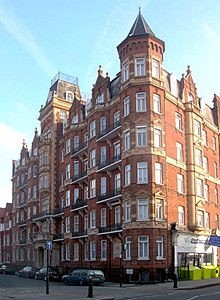
Yvette Cooper is a British politician serving as Shadow Home Secretary since 2021, and previously from 2011 to 2015. She served in Gordon Brown's Cabinet as Chief Secretary to the Treasury from 2008 to 2009 and Work and Pensions Secretary from 2009 to 2010. A member of the Labour Party, she has been Member of Parliament (MP) for Normanton, Pontefract and Castleford, previously Pontefract and Castleford, since 1997.
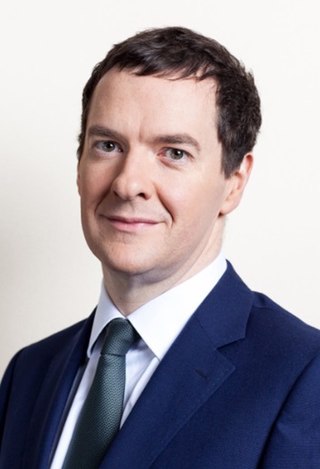
George Gideon Oliver Osborne is a former British politician and newspaper editor who served as Chancellor of the Exchequer from 2010 to 2016 and as First Secretary of State from 2015 to 2016 in the Cameron government. A member of the Conservative Party, he was Member of Parliament (MP) for Tatton from 2001 to 2017. He was editor of the Evening Standard from 2017 to 2020.
In British politics, a Lib–Lab pact is a working arrangement between the Liberal Democrats and the Labour Party.

Edward Samuel Miliband is a British politician serving as Shadow Secretary of State for Energy Security and Net Zero since 2021. He has been the Member of Parliament (MP) for Doncaster North since 2005. Miliband was Leader of the Labour Party and Leader of the Opposition between 2010 and 2015. Alongside his brother, Foreign Secretary David Miliband, he served in the Cabinet from 2007 to 2010 under Prime Minister Gordon Brown.

Johann MacDougall Lamont is a Scottish Labour Co-operative politician who served as Leader of the Scottish Labour Party from 2011 to 2014. She was previously a junior Scottish Executive minister from 2004 to 2007 and Deputy Leader of the Scottish Labour Party from 2008 until her election to the leadership in 2011. In addition to her ministerial and leadership roles, she has been a campaigner on equality issues and violence against women throughout her political career.

Sir Daniel Grian Alexander is a former politician who was Chief Secretary to the Treasury between 2010 and 2015. He was the Member of Parliament (MP) for the Inverness, Nairn, Badenoch & Strathspey constituency from 2005 until the general election in May 2015. In his first parliamentary term (2005–2010), Alexander was the Liberal Democrat spokesperson for Work and Pensions (2007–2008), the Chief of Staff to party leader Nick Clegg, and Chair of the Liberal Democrat Manifesto Group (2007–2010).
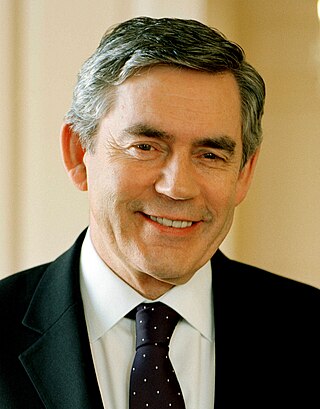
Gordon Brown's term as the prime minister of the United Kingdom began on 27 June 2007 when he accepted an invitation of Queen Elizabeth II to form a government, replacing Tony Blair, and ended on 11 May 2010 upon his resignation. While serving as prime minister, Brown also served as the first lord of the treasury, the minister for the civil service, and the leader of the Labour Party. He and Blair both extensively used the New Labour branding while in office, which was presented as the brand of a newly reformed party that had altered Clause IV and endorsed market economics, though Brown's style of government differed from that of his predecessor. Brown is the most recent Labour politician as well as the most recent Scottish politician to hold the office of prime minister.
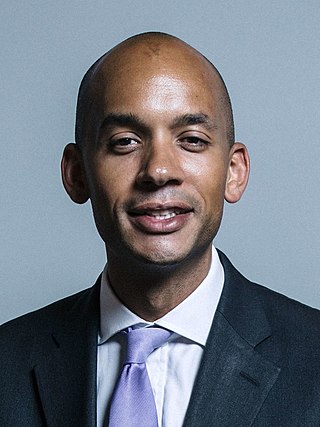
Chuka Harrison Umunna is a British businessman and former politician who served as Member of Parliament (MP) for Streatham from 2010 until 2019. A former member of the Labour Party, he was part of the Shadow Cabinet from 2011 to 2015. He left Labour in February 2019, when he resigned to form The Independent Group, later Change UK, along with six other MPs. Later in 2019, he left Change UK and, after a short time as an independent MP, joined the Liberal Democrats. In the 2019 general election, he was unsuccessful in being re-elected as an MP and did not return to the House of Commons.

David Wright Miliband is the president and chief executive officer (CEO) of the International Rescue Committee and a British Labour Party former politician. He was the Foreign Secretary from 2007 to 2010 and the Member of Parliament (MP) for South Shields in North East England from 2001 to 2013. He and his brother, Ed, were the first siblings to sit in the Cabinet simultaneously since Lord Edward and Oliver Stanley in 1938. He was a candidate for Labour Party leadership in 2010, following the departure of Gordon Brown, but was defeated by his brother and subsequently left politics.
The Browne Review or Independent Review of Higher Education Funding and Student Finance was a review to consider the future direction of higher education funding in England.

Edward Michael Balls is a British broadcaster, economist and former politician who served as Secretary of State for Children, Schools and Families from 2007 to 2010, and as Shadow Chancellor of the Exchequer from 2011 to 2015. A member of the Labour Party and the Co-operative Party, he was Member of Parliament (MP) for Normanton and later for Morley and Outwood between 2005 and 2015.
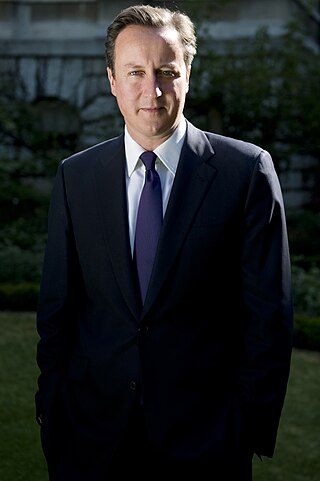
David Cameron's term as the Prime Minister of the United Kingdom began on 11 May 2010, when he accepted an invitation of Queen Elizabeth II to form a government, succeeding Gordon Brown of the Labour Party, and ended on 13 July 2016 upon his resignation following the 2016 referendum that favoured Brexit, which he had opposed. While serving as prime minister, Cameron also served as the first lord of the treasury, minister for the civil service and leader of the Conservative Party.

The June 2010 United Kingdom Budget, officially also known as Responsibility, freedom, fairness: a five-year plan to re-build the economy, was delivered by George Osborne, Chancellor of the Exchequer, to the House of Commons in his budget speech that commenced at 12.33pm on Tuesday, 22 June 2010. It was the first budget of the Conservative-Liberal Democrat coalition formed after the general election of May 2010. The government dubbed it an "emergency budget", and stated that its purpose was to reduce the national debt accumulated under the Labour government.

The 2011 United Kingdom budget, officially called 2011 Budget – A strong and stable economy, growth and fairness, was delivered by George Osborne, the Chancellor of the Exchequer, to the House of Commons on 23 March 2011.

Project Merlin is an agreement between the British Government of David Cameron and four of the major high street banks in the United Kingdom. These banks are Barclays, Lloyds Banking Group, the Royal Bank of Scotland and HSBC. The agreement covers aspects of banking activity, notably lending, pay and bonuses with the intention of promoting lending to businesses, particularly small businesses, curbing the size of bankers' bonuses and promoting transparency with regards to executive pay. The agreement was finalised on 9 February 2011.

The 2012 United Kingdom budget was delivered by George Osborne, the Chancellor of the Exchequer, to the House of Commons on Wednesday 21 March 2012.

"Pasty tax" was a popular phrase used by the British press to describe a proposal in the 2012 United Kingdom budget to simplify the tax treatment of "hot takeaway food" so that Value Added Tax (VAT) would be charged at 20% in all cases. The change would have increased the sale price of hot snacks such as sausage rolls and Cornish pasties sold on the premises where they were baked. The Chancellor of the Exchequer, George Osborne delivered the proposal of the so-called "March Budget".
The under-occupancy penalty results from a provision of the British Welfare Reform Act 2012 whereby tenants living in public housing with rooms deemed "spare" face a reduction in Housing Benefit, resulting in them being obliged to fund this reduction from their incomes or to face rent arrears and potential eviction by their landlord.
The 2015 United Kingdom general election debates were a series of four live television programmes featuring the leaders of seven main British parties that took place during the run-up to the general election. They each featured different formats and participants.
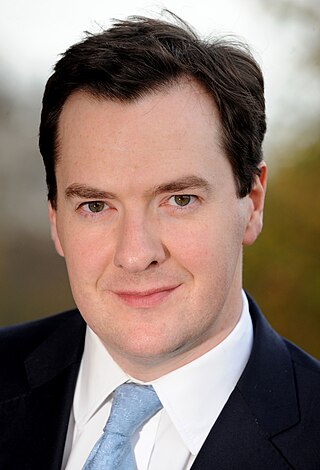
George Osborne served as Second Lord of the Treasury from May 2010 to July 2016 in the David Cameron–Nick Clegg coalition Conservative-Liberal Democrat government and the David Cameron majority Conservative government. His tenure pursued austerity policies aimed at reducing the budget deficit and launched the Northern Powerhouse initiative. He had previously served as Shadow chancellor in the David Cameron Shadow Cabinet from 2005 to 2010.
